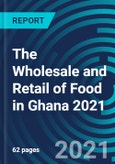This report focuses on the wholesale and retail of food in Ghana, a country that experienced rapid economic growth from 2010 when it began extracting oil from large offshore reserves. However, this growth has been tempered recently by the energy crisis, depressed commodity prices, long term macroeconomic imbalances and coronavirus. Many international retailers view Ghana as a gateway to a larger West African market of more than 260 million people. Although most food is still purchased at traditional markets, there is increasing demand from a relatively large and largely untapped market for the convenience and variety offered by formal retail and supermarkets.
Informal and Formal Sectors
The retail food sector in Ghana is dominated by the informal sector made up of traditional retail outlets including open air markets, street-side vendors and shops. Open air marketplaces are an integral part of the food retailing system. The formal wholesale and retail industry in Ghana is dominated by businesses that are owned by companies from India, Lebanon, and several European countries, while South African companies have been increasing their market share due to bilateral trade promotion with Ghana.
Imports
As Ghana’s underdeveloped domestic agricultural and food processing sector produces a limited selection of products, there is demand for imported food products, especially consumer-ready products. Most of these products are imported from South Africa, China, Europe, and the Middle East. International fast food brands cater mainly for the middle and high-income classes.
Report Coverage
This report focuses on the wholesale and retail of food in Ghana and includes information on the state of the sector, major players, corporate actions and developments. There are profiles of 10 companies including South African companies Shoprite and Massmart, international players such as Unilever, distributors such as Gold Coast Matcom and local companies such as PZ Cussons Ghana and Melcom.
Table of Contents
Companies Mentioned
- EcoDi Ltd
- Gold Coast Matcom (GCM) Ltd
- Massmart Holdings Ltd
- MaxMart Ltd
- Melcom Ltd
- PBC Ltd
- PZ Cussons Ghana Ltd
- Samba Foods Ltd
- Shoprite Holdings Ltd
- Unilever Ghana PLC
Methodology

LOADING...








